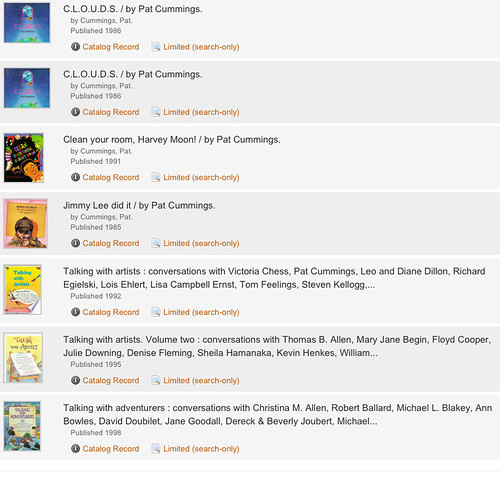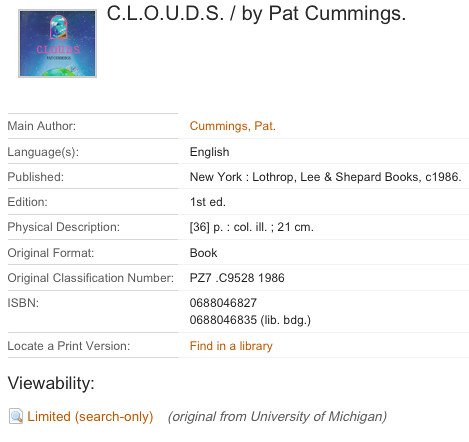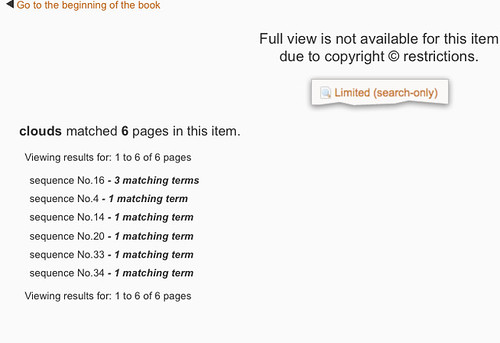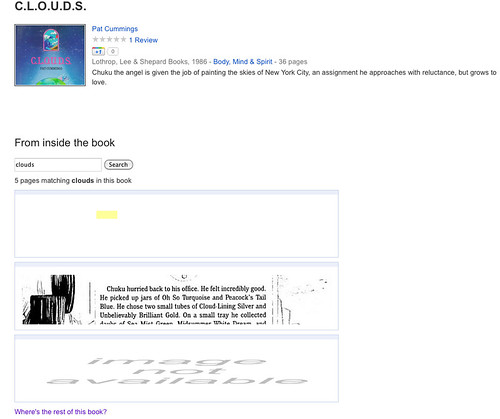(The Universal Interrogative Participle)* is going on with the Authors Guild?
*

Photo by Flickr user marfis75 (CC BY-SA 2.0)
by Emily Ford
The Authors Guild won’t give up. Their settlement agreement with Google Books was rejected by Judge Chin on March 22nd and will now be going to trial. But that’s not enough for the Authors Guild. The organization seems bound and determined for copyright legislation to occur, and for that legislation to change copyright law to be much more conservative and restrictive for libraries. In concert with their Australian and Quebecois counterparts – the Australian Society of Authors and the Québec Union of Writers – the Authors Guild has filed a legal complaint against HathiTrust, an organization of partner libraries that is collaboratively sharing and archiving millions of digitized works.
The filed complaint cites HathiTrust as making the “largest copyright infringements in history” (Rosenthal, E. H. & Goldman, J. S., 2011). Furthermore, the complaint argues: “Rather than heeding the Court’s words, and allowing Congress, acting in the interest of all communities, to determine the requirements and safeguards that will govern the use of digital libraries and orphan works, Defendants have instead proceeded on their own authority, ignoring the interests of copyright holders” (Rosenthal, E. H. & Goldman, J. S., 2011). It further claims that HathiTrust has exploited works by surpassing the rights allowed of them in Sections 107 and 108 of copyright law– Fair Use and preservation, respectively.
James Grimmelmann offers a nice, succinct explanation of the claims on his blog.
“The complaint alleges that the universities and HathiTrust are violating copyright owners’ rights by scanning, duplicating, and distributing their books. It doesn’t ask for damages, but it does request a declaration that what the defendants are doing violates the law. It also seeks an injunction to stop them from further scanning or displaying the books, and to “impound” the digital copies — i.e. have them held in escrow where the defendants can’t get at them.” (Grimmelmann, 2011)
Essentially, the Authors Guild complaint is bringing to the fore the very aspects of copyright law that permit libraries to perform their day to day functions.
I cannot claim to fully understand the nuances of copyright law, nor can I suppose that I understand everything about this case (I am not a lawyer).What I can claim to know is that events such as this shake up our profession and challenge how we think about the work we do in libraries everyday. It renders to the forefront of our minds questions such as: How we will be able to provide unfettered access to information that has yet to be created? Will legal issues halt our work and at what cost to our patrons? At what cost to society as a whole?
In light of this case and in the current copyright climate– which seems rife with tension between creators, content providers and libraries– the library community needs to be thoughtful about how to grow into an unknown copyright future.
Before I continue I’ll provide some brief background regarding the parties involved in the case.
The Parties
HathiTrust & Universities
HathiTrust was born out of libraries’ collaboration with Google to digitize books. Those libraries who loaned Google books received digital scan and metadata files from Google. Some of the libraries working with Google had an agreement with the company that they could create a digital archive accessible to their communities. From this, HathiTrust was created.
Begun and spearheaded by University of Michigan Libraries, HathiTrust began with member libraries coming from Committee on Institutional Cooperation (CIC) institutions, University of California, and the University of Virginia. Since its inception in 2008, HathiTrust has grown to include over 50 library members. Member libraries can contribute content to the digital library. Some collection highlights of HathiTrust include a collection of 19th century Cookbooks and Hebrew and Yiddish Public Domain book titles held by Stanford University. Moreover HathiTrust has recently come to agreements with discovery service vendors EBSCO, Serials Solutions, and OCLC to make full-text searching a part of these respective discovery service tools.
Works contained in the HathiTrust Digital Library include orphan works, those in the public domain, and works still under copyright protection. HathiTrust has measures in place for users from different institutions to authenticate and have permissions to view in copyright titles. Guests or users from institutions that do not own a physical copy of a copyright protected title, do not have permission to view full text of those works.
HathiTrust had scheduled to make several hundred orphan works available to users on October 13th. University of Michigan Library has postponed their release of orphan works (which were to only be available to users whose home libraries own the physical item) due to flaws in their system of determining what works are orphans. For example:
“In a post on its blog this week, Authors Guild representatives noted that author J.R. Salamanca’s 1958 novel The Lost Country was on the list. Librarians did not elaborate on how the book made the orphan list. A record search shows that the book was copyrighted in October, 1958, and was renewed in December 1986—seemingly a month late to keep the book’s 28-year copyright from lapsing. But, in one of many quirks in the complex copyright laws, books copyrighted between 1950 and 1963 have more time to renew, until December 31of the 28th year. The book has been long out of print.” (Albanese, 2011)
There have been other cases on the list of orphan works for which individuals were able to readily find copyright holders. One would surmise, however, that should HathiTrust be notified that a copyrighted work had been made public, HathiTrust would have processes in place to disable public access to that content. (HathiTrust does have a take-down policy.)
In addition to naming HathiTrust as a defendant in the case, the lawsuit names five universities. They are: University of Michigan, University of California, University of Wisconsin, Indiana University, and Cornell University. Grimmelmann points out in his blog post that “All of the named universities except for Indiana have announced their plans to participate in HathiTrust’s Orphan Works Project. The other members of HathiTrust, including Universities that are participating in the Project (e.g. Johns Hopkins and Florida) but are not Google Books Library Partners, are not named as defendants” (Grimmelmann, 2011).
The Authors Guild
The Authors Guild is an organization of writers whose mission is to provide copyright advocacy work on behalf of its members. In addition to suing Google for the Google Books Search, it has been a party in lawsuits against Dialog, Gale, and others.
Current Authors Guild President Scott Turow is featured as a library advocate on a poster produced and sold by ALA. Moreover, his editorial of February 15th this year decries budgets cuts to libraries. It is ironic that he is such an avid library supporter, and yet his organization is asking for HathiTrust to cease its operations.
In a letter to Authors Guild members, Turow addresses the guild’s stance on copyright. His language borders on hysterical.
“The Digital Millennium Copyright Act’s “safe harbor” for online service providers has turned out to be an exploitable gold mine for unscrupulous online enterprises. That safe harbor allows these rogue enterprises to profit from services that encourage and conceal the trafficking in stolen books, music and movies, while disclaiming responsibility for that illegal traffic. The DMCA safe harbor has turned copyright’s incentives inside out, encouraging massive, global investment in piracy technologies and services.” (Turow, 2011)
What Turow seems to be implying is that, in addition to allowing easier copyright infringement, the HathiTrust system is encouraging online providers to take advantage and to make a profit, and then claim that they are not responsible.
Although in his letter he cites libraries as positive examples of how copyright can function. “Our great research libraries, holding the carefully crafted thoughts, composed over billions of hours by many of our nation’s finest minds, are ample proof that copyright has succeeded brilliantly” (Turow, 2011). Although Turow is a self-professed library advocate, he does not seem to understand that, in practice, libraries and librarians make all attempts to respect and protect copyright. The lawsuit against HathiTrust appears to lump libraries into this category that Turow repeatedly refers to as “pirates.”
HathiTrust already has measures in place to protect copyrighted works via authentication. In general, libraries and librarians work hard to respect copyright law. Usually authors and libraries are on the same side, wanting to ensure access to works, but also respecting copyright law. So where is the breakdown between the two?
The Authors
In addition to the Authors Guild and other author associations, eight individual authors are named plaintiffs in the lawsuit against HathiTrust. They are: Pat Cummings, a children’s book author; novelists Angelo Loukakis, Roxana Robinson, Danièle Simpson, and Fay Weldon; André Roy, a poet; James Shapiro, Columbia University professor and scholar; and biographer T.J. Stiles.” Each of these authors except for Fay Weldon, are executive board members or are governmental representatives in their respective organizations. But there are two of these authors whose other associations are compelling to me when thinking about this particular lawsuit.
James Shapiro
James Shapiro is a professor at Columbia who is a prominent scholar on Shakespeare. He is a member of the Authors Guild Board of Directors and he is the only academic author named in the case. Columbia is also home to Dr. Kenneth Crews, Columbia’s Copyright Advisory Office Director, and the Columbia University Library, which is a HathiTrust member.
Columbia University Libraries were one of the first institutions to join the HathiTrust (aside from founding institutions University of California and CIC institutions) in 2009. Columbia’s Copyright Advisory Office’s “central function is to address in an innovative, creative, and pragmatic manner the relationship between copyright law and the work of the university community” (Columbia University Copyright Advisory Office, 2011). Shapiro has one work cited in this suit, Oberammergau. In fact, the imprint of the book as seen in Google Books, shows him as copyright holder.
The relationship between copyright law and university professionals is a complicated matter. Many institutions have policies that indicate the university is sole copyright holder for many works created under the auspices of teaching and university related work. This is called “work for hire.” For other works, such as scholarly writing and contributions, most universities consider authors the copyright holders of those works. Columbia is not an exception. “By longstanding custom, faculty members hold copyright for books, monographs, articles, and similar works as delineated in the policy statement, whether distributed in print or electronically. This pattern will not change. This copyright policy retains and reasserts those rights” (Columbia University, 2000).
It will be interesting to see how this tension between one of Columbia’s prized faculty members and a HathiTrust member institution plays out. Has Shapiro put himself at odds with his academic community via his ties to the Authors Guild and this lawsuit?
This situation at Columbia is a great opportunity for library outreach to authors, and to provide copyright education programming. It would be interesting to hear a panel debate regarding academic authors’ understanding of copyright, their views on the HathiTrust lawsuit and the book publishing industry. Since Shapiro is a named author in the case, he is surely not able to engage in programming in this way. At the same time, other faculty may be open to participating and engaging, in consort with the library, the Scholarly Communication Program and the Copyright Advisory Office.
Other libraries may want to seize this opportunity to engage with academic authors and their communities. Hosting a public debate between an academic author who sides with the Authors Guild and one who does not, might be of interest to a community.
Angelo Loukakis
Angelo Loukakis is the Executive Director of the Australian Society of Authors, another of the plaintiffs in the suit. Loukakis is also represented by HarperCollins Publishers in Australia. Yes, the same HarperCollins that has instituted a 26 loan cap on ebook licenses. While Loukakis probably has nothing to do with his publisher’s restriction of ebooks, I am speculating that in the publishing realm, the publishers’ and now the authors’ attitudes subscribe to the rhetoric of pirates and piracy, as we saw in Turow’s letter.
Bullying?
I can’t help it but this whole thing is making me think of the It Gets Better campaign. The big dogs are bullying the little guys, and the little guys are just trying to be who they are and do what they do.
I usually cheer on authors and other creators who actively pursue protecting their copyrights. It’s how we librarians work with academic authors, advising them to keep their copyrights when publishing in academic journals and negotiating with publishers for more favorable license agreements. (Favorable license agreements allow authors to keep their copyrights, instead of transferring all copyrights to a publisher.) It’s what libraries do when they take on the publishing role as academic journal publishers or repository managers. A good example of this is Pacific University, where several open access journals are hosted on the library’s repository infrastructure. It is in these ways that libraries work with authors to show respect for and assist in copyright issues. One of the main differences that I see between this kind of work and the lawsuit, however, is the distinct lack of academic or scholarly authors represented by the Authors Guild.
Here’s an example from outside the library world that makes me cheer on the creator. Bijijoo (not everything on this site is safe for work), an artist and a friend of mine, is pursuing NBC for their repeated infringement of his copyrights. Bijijoo is not in consort with a guild or an interest group. He is a humble artist attempting to pursue his rights. He just wants the recognition, and as his first letter states, he just wants to give Tina Fey a painting that depicts her holding a ham. Oh, and he wants NBC to acknowledge their copyright infringement. Bijijoo is a little dog who’s not afraid to stand up to the pack.
In the HathiTrust case, the Authors Guild is coming across as as a bully. An organization that represents authors’ monetary interests and an almost hysterical fear of piracy, is going after university libraries. To me this smells of a case of the big dogs going after the runts.
This case is exemplary of a mindset regarding copyright that is becoming more widespread. Publishers like HarperCollins have locked down ebooks; Amazon hasn’t yet published their ebooks in epub format (Perlow, 2010); orchestras can’t perform Shostakovich; and groups like the Authors Guild, the American Association of Publishers, and numerous others point to a fearful climate surrounding copyright. To this end, I wonder to what extent the Authors Guild (or any other representative organization) actually supports individual authors’ interests. Siva Vaidhyananathan commented on Grimmelmann’s post:
“James, Thanks for this. But please don’t call the Authors’ Guild “the authors.” We authors have never and will never be represented by the Authors’ Guild. Siva”
It is unclear whether the Authors Guild as an organization, considers itself a big dog. Certainly, as the preceding quote by Vaidhyananathan indicates, authors alone do not. As with any large membership organization, the Authors Guild operates under the guidance of a board, executive director, and legal counsel. Certainly within our own profession, our organizations have taken action or made statements with which we, as individuals, disagree. The question remains, to what extent does the Authors Guild represent members’ interests? Have they gone too far and will there be a movement from membership to leave the organization?
What actually happens in the HathiTrust Digital Library?
I wanted to see exactly what happened when a user of the HathiTrust Digital Library looked at a record for a copyrighted book. I used an example by Pat Cummings (one of the plaintiffs and the Author Guild’s Secretary).

Search Results for Pat Cummings Books in HathiTrust

Record View of C.L.O.U.D.S. in HathiTrust by Pat Cummings

Text Search of C.L.O.U.D.S. by Pat Cummings in HathiTrust
As you can see from the screenshot above, a search of the text of C.L.O.U.D.S. does not show snippets of the book. See the snapshot from Google as a comparison.

C.L.O.U.D.S. in Google Books
Another example of HathiTrust content is that of something in the public domain. Just this week I helped a patron find a digital copy for The Seven Golden Odes of Pagan Arabia in HathiTrust Digital Library. The patron wanted to download and print the book, but we discovered that we did not have sufficient rights to download the entire digital copy, although we could view the entire text.
These restrictions mirror what happens in physical libraries and with their borrowing policies. A patron unaffiliated with my institution is welcome to read through a book in the library building, but unless she pays to become a public patron of the library, she may not borrow materials.
Some Discrepancies
Several of those who have already written about this new lawsuit, have pointed to a discrepancy in what the Authors Guild sees as the purpose of copyright law. In her editorial Francine Fialkoff points to this discrepancy. “It’s also a subversion of copyright law, which protects library fair use. Despite the extensions of copyright protection over the past couple of decades, copyright was never meant to protect authors or inventors indefinitely. Instead, as Fister reminds us, it aims to promote the public good, “the Progress of Science and useful Arts.” “What is more troubling to me,” she says, “is…that copyright is being read as a one-sided right: for authors…as a moral right, not as a balance of interests recognized by law”” (Fialkoff, 2011).
Part of what is so frustrating about this lawsuit is that libraries and library collaboratives would not exist without the creative works produced by authors, musicians, and other creators. And likewise, many authors advocate for libraries. Just look at the Authors for Libraries partnership via ALA. Librarians and the Authors Guild agree that copyright law does not address the multitude of uses or technologies prevalent in our societies. Take, for example, the now classic ebook problem. A library purchases an ebook, but it has a limited number of loans. Similarly, print books are loaned until they become too damaged by dog teeth, coffee spills, loss, or disasters. While physical books are by no means permanent, their tangible nature instill in us a comfort of the illusion of perpetuity. So, is buying an ebook and loaning it to patrons until irreparably damaged or lost (not via DRM, mind you) a violation of copyright law?
Copyright law is, by its nature, subject to multiple and layered interpretations. The minute we legislate and create more distinct copyright rules, libraries will potentially be more restricted in how they are able to provide their services. Does the Authors Guild really want to restrict libraries’ ability to provide good service and access to authors’ works? Do authors want to engage their readers and create rich intellectual experiences? When will the bullying stop?
The phrasing used by Turow in his letter to members represents fears driven by money. It points to the effect of digital content on the market and authors’ purported monetary losses.
“One is tempted to call it a vast underground economy, but there’s nothing underground about it: It operates in plain sight, as I will describe. Money suffuses the system, paying for countless servers, vast amounts of online bandwidth, and specialized services that speed and cloak the transmission of stolen creative work. Excluded from this flow of cash are the authors, musicians, songwriters and the publishers who invest in them.” (Turow, 2011)
Turow’s letter concentrates on the evils of file sharing and the networked nature of information in a global age. In light of the HathiTrust lawsuit, is the Authors Guild equating the libraries with BitTorrent?
So what are we to do?
Because of the nature of their work, libraries are those institutions that push copyright to its limit. The HathiTrust lawsuit presents us with the opportunity to re-examine copyright in our daily work lives. What DO you know about copyright? What is your institution’s policy? Are you making use of Fair Use? Individual librarians may feel ill-prepared to answer these questions, so it’s a perfect time to seek out your local Scholarly Communication Librarian and Access Services Librarian to refresh our memories.
Last year a copyright slider showed up in my inbox and every other librarian where I work received one as well. This seems to be an affordable way to show your employees that you expect them to be able to practice their craft.
Now is a good time for library schools to respond to libraries and the current copyright climate. Library school students who learn about copyright law as applicable in library work, will be better prepared to address issues facing them in their professional lives. I’d be willing to bet that no ALA accredited library school requires students to learn and show proficiency in understanding copyright in libraries. Our profession would be better off if they were.
When I was a student I took a 1.5 credit workshop on copyright– and it was a small class. You may not be passionate about understanding copyright, just like some are not passionate about cataloging, but anyone who wants to work in a library who claims to not want to know about copyright will be ill-prepared for her career in libraries. It’s like wanting to work in a library because you don’t want to work with computers and you want to work with books instead. Understanding and teaching about copyright is part of what we do, and, on the whole, we do it poorly. Usually there’s only one or two people in a library who feel comfortable answering questions in regards to copyright. In academic libraries those who work with course reserves usually know, but does anyone else? Sometimes the extent of copyright education in libraries is the sign by the photocopier asking patrons to respect copyright. Guess what? Our patrons probably don’t even know what that really means. Should we not be empowered to teach them?
The Library Copyright Alliance has stated that “The case has no merit, and completely disregards the rights of libraries and their users under the law, especially fair use” (Band, 2011). This will be a long legal procedure, especially if the Google Book Search suit is any indication. But that probably doesn’t ease the feeling of vulnerability and helplessness that you may be feeling in response to this suit. What if my library gets sued? What if it doesn’t? What if, ultimately, HathiTrust prevails and large scale digitization projects become ubiquitous?
We need to continue our good work with passion and vigor. We can continue to use Fair Use to its full extent to provide access to materials to our library patrons. We can continue to make copies of copyrighted works for preservation purposes. We can continue to improve our patrons’ access to works online.
I am certain that the current copyright climate and the tension between authors, publishers, and libraries will change. I remain optimistic that the original intent of copyright, the public good, will prevail.
Many thanks to Jill Emery for her thoughtful questions. Thanks also to Lead Pipers Hilary Davis, Leigh Anne Vrabel, and Eric Frierson for edits, comments, and thought provoking questions. And thanks to Jake Shivery, who, despite not understanding librarian-ese, provided final copy edits.
References and Further Readings

Thank you for such a detailed post about the situation with HathiTrust. It is refreshing to find a post with citations such as this! One minor point — it is “Indiana University,” not the “University of Indiana.”
Hi Amy. Thanks! And thanks for the correction. I’m mortified, since I’m IU is where I went to library school! In fact, I’m so mortified that I’m changing it right now. Thanks for the correction.
Emily
Pingback : “In the Library with the Lead Pipe” on the Authors Guild v. HathiTrust
And now the complaint has been expanded to include more authors! Read more at Publisher’s Weekly.
From the article, Turow is quoted as going so far as to say libraries are engaging in piracy. WHAT?
Scott Turow, president of the Authors Guild, even accused the libraries of the p-word. “Universities are important cultural bastions, valued by all of us,” he said, “In this case, university defendants are using their immunity from money damages to act as pirates, rather than custodians, of our literary heritage.” – Publisher’s Weekly
Thank you for this overview Emily, I feel much more informed, and interested.
I’m curious to know how the Authors’ Guild suit against HathiTrust compares with their suit against Google. Are they making the same basic case?
My moral tarot tells me that Google’s principal wrongdoing was to digitize works without getting prior consent from copyright holders.
From what you are saying, it sounds like HathiTrust includes works (many digitized by Google) by default but copyright holders can opt out. Is HathiTrust making the same transgression as Google?
Caleb,
Thanks for your comment. I do not think that HathiTrust is making the same transgression as Google. Take a peek at the information provided here:
Providing general access to public domain works; where we have the explicit permission of the rights holder, providing general access to in-copyright works; providing access under limited circumstances to other in-copyright works in accordance with copyright law. Limited circumstances include access to persons who have print disabilities, access to orphan works, and uses of materials (such as print replacement copies) that fall under Section 108 of U.S. copyright law. Access in these limited circumstances is provided under the following conditions…
The suit against Google asked for damages– the suit against HathiTrust does not. It seeks an injunction. The Google case got so confused by the settlement agreements that failed. We’ll see what happens next.
Does this answer your questions?
this is helpful thanks!
Excellent, thought-provoking post! I am, unfortunately, an academic librarian who could certainly stand to know more about copyright…this is a great refresher/reminder/kick in the butt. :)
Pingback : My Experience at the HathiTrust Uncamp « Hack Library School